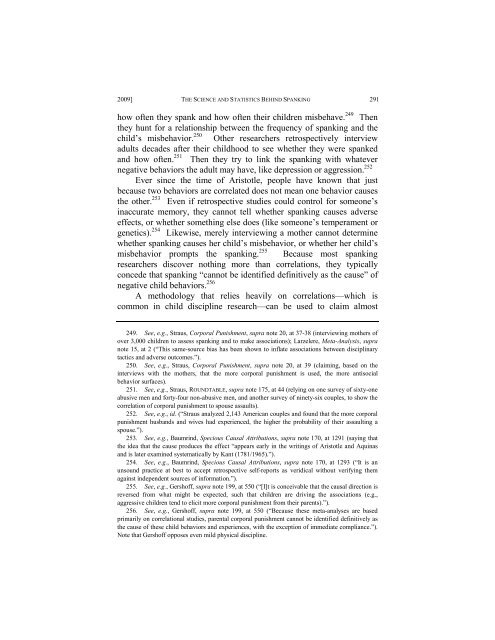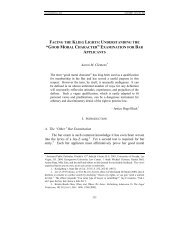The Science and Statistics Behind Spanking Suggests that
The Science and Statistics Behind Spanking Suggests that
The Science and Statistics Behind Spanking Suggests that
You also want an ePaper? Increase the reach of your titles
YUMPU automatically turns print PDFs into web optimized ePapers that Google loves.
11-FULLER_FINAL_AFTERPROOF.DOC 2/17/2009 8:50 AM<br />
2009] THE SCIENCE AND STATISTICS BEHIND SPANKING 291<br />
how often they spank <strong>and</strong> how often their children misbehave. 249 <strong>The</strong>n<br />
they hunt for a relationship between the frequency of spanking <strong>and</strong> the<br />
child’s misbehavior. 250 Other researchers retrospectively interview<br />
adults decades after their childhood to see whether they were spanked<br />
<strong>and</strong> how often. 251 <strong>The</strong>n they try to link the spanking with whatever<br />
negative behaviors the adult may have, like depression or aggression. 252<br />
Ever since the time of Aristotle, people have known <strong>that</strong> just<br />
because two behaviors are correlated does not mean one behavior causes<br />
the other. 253 Even if retrospective studies could control for someone’s<br />
inaccurate memory, they cannot tell whether spanking causes adverse<br />
effects, or whether something else does (like someone’s temperament or<br />
genetics). 254 Likewise, merely interviewing a mother cannot determine<br />
whether spanking causes her child’s misbehavior, or whether her child’s<br />
misbehavior prompts the spanking. 255 Because most spanking<br />
researchers discover nothing more than correlations, they typically<br />
concede <strong>that</strong> spanking “cannot be identified definitively as the cause” of<br />
negative child behaviors. 256<br />
A methodology <strong>that</strong> relies heavily on correlations—which is<br />
common in child discipline research—can be used to claim almost<br />
249. See, e.g., Straus, Corporal Punishment, supra note 20, at 37-38 (interviewing mothers of<br />
over 3,000 children to assess spanking <strong>and</strong> to make associations); Larzelere, Meta-Analysis, supra<br />
note 15, at 2 (“This same-source bias has been shown to inflate associations between disciplinary<br />
tactics <strong>and</strong> adverse outcomes.”).<br />
250. See, e.g., Straus, Corporal Punishment, supra note 20, at 39 (claiming, based on the<br />
interviews with the mothers, <strong>that</strong> the more corporal punishment is used, the more antisocial<br />
behavior surfaces).<br />
251. See, e.g., Straus, ROUNDTABLE, supra note 175, at 44 (relying on one survey of sixty-one<br />
abusive men <strong>and</strong> forty-four non-abusive men, <strong>and</strong> another survey of ninety-six couples, to show the<br />
correlation of corporal punishment to spouse assaults).<br />
252. See, e.g., id. (“Straus analyzed 2,143 American couples <strong>and</strong> found <strong>that</strong> the more corporal<br />
punishment husb<strong>and</strong>s <strong>and</strong> wives had experienced, the higher the probability of their assaulting a<br />
spouse.”).<br />
253. See, e.g., Baumrind, Specious Causal Attributions, supra note 170, at 1291 (saying <strong>that</strong><br />
the idea <strong>that</strong> the cause produces the effect “appears early in the writings of Aristotle <strong>and</strong> Aquinas<br />
<strong>and</strong> is later examined systematically by Kant (1781/1965).”).<br />
254. See, e.g., Baumrind, Specious Causal Attributions, supra note 170, at 1293 (“It is an<br />
unsound practice at best to accept retrospective self-reports as veridical without verifying them<br />
against independent sources of information.”).<br />
255. See, e.g., Gershoff, supra note 199, at 550 (“[I]t is conceivable <strong>that</strong> the causal direction is<br />
reversed from what might be expected, such <strong>that</strong> children are driving the associations (e.g.,<br />
aggressive children tend to elicit more corporal punishment from their parents).”).<br />
256. See, e.g., Gershoff, supra note 199, at 550 (“Because these meta-analyses are based<br />
primarily on correlational studies, parental corporal punishment cannot be identified definitively as<br />
the cause of these child behaviors <strong>and</strong> experiences, with the exception of immediate compliance.”).<br />
Note <strong>that</strong> Gershoff opposes even mild physical discipline.

















